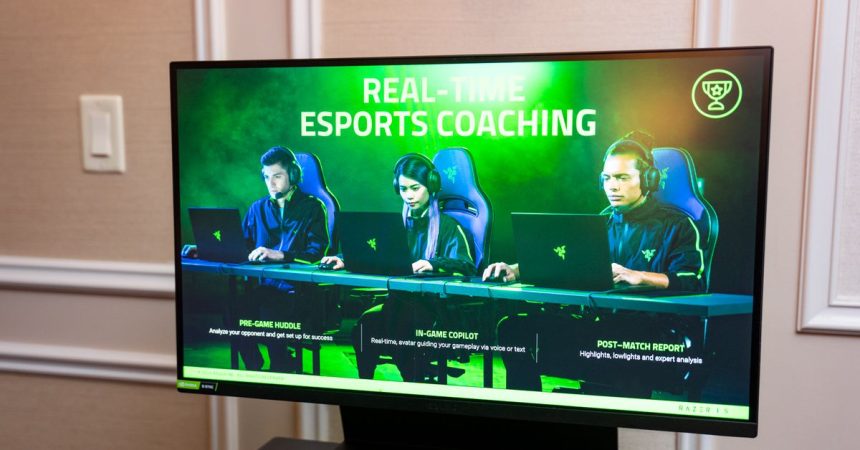Razer, a gaming hardware manufacturer renowned for its high-performance peripherals and systems, is venturing into the realm of artificial intelligence with a potentially disruptive new project: Ava, an AI gaming copilot designed to elevate players’ skills and gameplay experience. This ambitious endeavor involves Ava capturing thousands of screenshots of a player’s game screen in real-time and, with the player’s consent, providing context-specific guidance, optimal strategies, and even predictive insights derived from analyzing millions of simulated scenarios. This real-time coaching system is portrayed as an always-available resource for overcoming in-game challenges, potentially revolutionizing how players approach and master complex games.
Ava’s capabilities were demonstrated during a pre-recorded video of a challenging boss fight in the upcoming game Black Myth: Wukong. The AI assistant offered precise and timely advice, such as prompting the player to dodge specific attacks based on the boss’s animations and health status, predicting the boss’s movements, and even warning of imminent grapple attacks. While such assistance might seem like a welcome alternative to consulting external guides, the ethical implications of using game guides to train the AI without crediting or compensating the original creators raise concerns. Furthermore, the potential for Ava to interrupt gameplay audio with advice, while possibly helpful, could be perceived as intrusive and detract from the immersive experience. The notion of an AI assistant designed for elite gamers, a demographic traditionally associated with skill and self-reliance, also presents an intriguing paradox.
Beyond its application in single-player games, Ava’s potential extends to the competitive multiplayer arena. A live demonstration showcasing Ava’s functionality in League of Legends highlighted its ability to act as an AI chatbot, offering real-time guidance on item builds, spell selection, and strategic decision-making based on the game’s state, API calls, available guides, and potentially even historical esports data. By analyzing the mini-map, Ava can track enemy champion positions and suggest appropriate counter-strategies. However, the prototype demonstrated a noticeable delay in response time, attributable to its reliance on local hardware using powerful GPUs and Meta’s Llama 3.2 LLM instead of cloud processing. Post-match, Ava’s coaching capabilities extend to generating replays, providing personalized feedback, and highlighting areas for improvement.
While the demonstrated capabilities are impressive, considerable development is required to fully realize Ava’s potential and achieve Razer’s ambitious vision. Beyond in-game coaching, Razer envisions Ava evolving into a multifaceted gaming companion capable of auto-configuring computer settings, acting as an autonomous gaming partner, and even assuming the role of a raid leader in group-based scenarios. These expanded functionalities represent significant technical challenges and require substantial further development.
Unlike many of Razer’s conceptual projects that never reach the consumer market, Ava appears to be a serious undertaking, with Razer viewing it as a potential new business venture. The company is actively building a dedicated team of AI developers and planning a more comprehensive announcement at the Game Developers Conference (GDC) in March. This commitment suggests that Razer is not merely testing the waters but is fully invested in exploring the potential of AI in gaming. Razer is also actively pursuing a patent for its unique algorithm for generating gaming tips and is developing proprietary AI hardware to enhance Ava’s performance. The company acknowledges the emerging competition in the AI gaming coaching space and is actively strategizing to differentiate itself through its cloud service offering.
Razer’s foray into AI-powered gaming assistance with Ava represents a significant and potentially transformative step in the gaming industry. While the concept holds immense promise for enhancing player skills and enriching the gaming experience, it also raises important questions about the ethical use of training data, the potential for disrupting gameplay immersion, and the acceptance of AI assistance within the competitive gaming community. The success of Ava hinges on addressing these challenges effectively and delivering a seamless and truly valuable service to gamers. The coming months will be crucial for Razer as they refine their technology, address ethical considerations, and ultimately determine whether Ava can truly live up to its potential and revolutionize the way we play. The competitive landscape, with other emerging players in the AI gaming coaching space, adds further complexity, necessitating a strategic approach to differentiation and market penetration.



